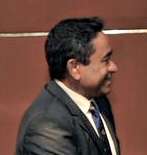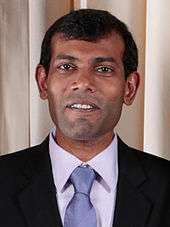Maldivian presidential election, 2013
| | |||||||||||||||||||||||
| |||||||||||||||||||||||
| |||||||||||||||||||||||
| |||||||||||||||||||||||
Presidential elections were held in the Maldives under a two-round system. The result of the initial vote held on 7 September 2013 was annulled by the Supreme Court and the election was re-run on 9 November. As no candidate achieved majority support, a run-off election (delayed by Supreme Court decree) was held on 16 November. Abdulla Yameen was elected President.
Following 7 September initial vote no candidate received a majority of the vote, and a second round was planned for 28 September, to be contested by former President Mohamed Nasheed and Abdulla Yameen – incumbent President Mohammed Waheed Hassan came fourth in the first round of voting. However, on 27 September the Supreme Court cancelled the run-off and annulled the first round results.[1] A re-run of the first round was held on 9 November,[2] producing a similar result to the annulled election, and the run-off was planned for the following day due to the need to have a new President in place by 11 November. However, the run-off was postponed to 16 November by the Supreme Court after Yameen claimed he needed more time to campaign.[3] Yameen won the run-off with his share of the vote rising from 30% in the first round to 51% in the second round; in comparison Nasheed's share increased by only 2% between rounds.[4][5]
Nasheed was contesting the election following his controversial resignation amidst the 2011–12 Maldives political crisis with the aim of returning to the presidency after what he maintains was a coup d'état orchestrated by his deputy and successor Mohammed Waheed Hassan. Hassan contested the initial elections, but dropped out of the re-run after receiving only 5% of the vote.[6] Yameen, paternal half-brother of former president Maumoon Abdul Gayyoom was the candidate from Gayyoom's party, the Progressive Party.
Background
2011–12 political crisis
Political friction in the country escalated in December 2011, when an opposition alliance 'Madhanee Ithihaad' was formed, which included the parties that supported the President Mohamed Nasheed in his 2008 presidential race. On 23 December, the capital city was rocked by protests by the opposition against the President Mohamed Nasheed.[7] Further events transpired leading to the arrest of Chief Justice Abdulla Mohamed from his house by the military.[8][9] This arrest sparked violent protests near the Republic Square. After the government refused to disclose any information to the public, the protests started gaining momentum. Demands went up for an independent investigation into the Judge and to arrest him according to the constitution and for the president to stop using executive power over another institution.[10][11] The protest extended for over 22 days in the Republic Square and on 6 February 2012, the Maldives Police Service declined to use force to control or disperse the protests and joined the protest for the release of Judge Abdulla Mohamed.[12] President Nasheed resigned the following day.
On 8 February 2012, the Maldivian Democratic Party announced for all its members across the country to go into streets in protests. President Mohamed Nasheed led the protests to Republic Square, announcing that he was forced to resign at gunpoint, and that the event was a coup d'etat orchestrated by Vice-President Mohammed Waheed Hassan, who was sworn in as the new president of Maldives on the same day in accordance with the law of the Maldives.[13] An independent National Commission of Inquiry later ruled that there was no evidence for Nasheed's version of events, a finding supported by the US and the Commonwealth of Nations.
After Nasheed and his supporters continued to protest Waheed's removal from office, he agreed to call a snap election. In April 2012, Waheed set the election for July 2013, stating that no earlier election was constitutionally possible. However Nasheed, strongly opposed this idea instead arguing for a 2012 election to settle the disputed presidency. This date was later then pushed down to September 2013, to when the next presidential election would constitutionally be taking place.
Candidates
Incumbent President Mohammed Waheed ran as an independent candidate but backed by the National Unity Party and the Dhivehi Rayyithunge Party. Former President Mohamed Nasheed was the Maldivian Democratic Party's candidate. Gasim Ibrahim is the candidate of the Jumhooree Party (JP) and is supported by the Adhaalath Party (AP) and the Dhivehi Qaumee Party.[14]
Leader of the Progressive Party of Maldives, former president Maumoon Abdul Gayyoom, declared that he would not participate in any further election on 25 February.[15] PPM held its presidential primary election on 30 March. The candidacy was won by the party's parliamentary group leader, and half-brother of Gayyoom, Abdulla Yameen with 63% of the vote, beating rival candidate Umar Naseer. A total of 31,298 PPM members were eligible to vote in the party's presidential primary through one of the 167 ballot boxes placed in 140 islands.[16] In August, new political party Maldives Development Alliance (MDA) signed a coalition agreement with PPM to provide support in the presidential election.[17]
Results
| Candidate | Party | Annulled election | Re-run | ||||
|---|---|---|---|---|---|---|---|
| First round | Second round | ||||||
| Votes | % | Votes | % | Votes | % | ||
| Mohamed Nasheed | Maldivian Democratic Party | 95,224 | 45.45 | 96,764 | 46.93 | 105,181 | 48.61 |
| Abdulla Yameen | Progressive Party of Maldives | 53,099 | 25.35 | 61,278 | 29.72 | 111,203 | 51.39 |
| Qasim Ibrahim | Jumhooree Party | 50,422 | 24.07 | 48,131 | 23.35 | ||
| Mohammed Waheed Hassan | Independent | 10,750 | 5.13 | ||||
| Invalid/blank votes | 2,395 | – | 2,331 | – | 2,237 | – | |
| Total | 211,890 | 100 | 208,504 | 100 | 218,621 | 100 | |
| Registered voters/turnout | 239,593 | 88.44 | 239,105 | 87.20 | 239,165 | 91.41 | |
| Source: Government of the Maldives, Government of the Maldives | |||||||
Annullment
Following the original first round on 7 September, the Supreme Court annulled the elections and cancelled the planned second round by a vote of four to three. Voting in favour of the annulment, Judge Ahmed Abdulla Didi referenced a confidential police report that claimed that 5,623 ineligible people had voted in the elections including dead people and others under 18.[1] The rechecking of voters' registry was carried out in the presence of the staff of Elections Commission and the Police Service.
References
- 1 2 Maldives top court annuls 7 September presidential vote, sets new election Reuters via Yahoo! News, 8 October 2013
- ↑ DG Roundup 16–22 October 2013 IFES
- ↑ Maldives election: Supreme Court delays run-off vote BBC News, 10 November 2013
- ↑ "Yameen wins Maldives presidential run-off – Central & South Asia". Al Jazeera.
- ↑ Official results 1st round, 2nd round
- ↑ Maldives holds fresh election for president BBC News, 9 November 2013
- ↑ "Mega Protests to occur all across Maldives tomorrow: President". Maldivestoday.com. Retrieved 22 December 2011.
- ↑ "Maldives Military Arrests Chief Judge Abdulla Mohamed". Haveeru Online.com. Retrieved 16 January 2012.
- ↑ "Police arrest Judge Abdulla against court orders". haveeru.com. Retrieved 17 January 2012.
- ↑ "Judge Abdullah Mohamed is arrested illegally even if I am crushed into pieces:: Kulhudhufushi PM Nasheed". miadhu.com. Retrieved 27 January 2012.
- ↑ "Judge Abdulla's arrest unconstitutional: Suood". miadhu.com. Retrieved 3 February 2012.
- ↑ "Maldivian police join protesters". sundaytimes.lk. Retrieved 7 February 2012.
- ↑ Andrew North (8 February 2012). ""Maldives ex-president Mohamed Nasheed was 'forced out'" ''BBC News:World:Asia'' 8 February 2012". BBC.
- ↑ "IFES Election Guide | Elections: Maldives Pres 2013". Electionguide.org.
- ↑ "Gayoom opts out of PPM presidential primary | Minivan News". Minivannews.com.
- ↑ "Yameen elected as PPM presidential candidate | Minivan News". Minivannews.com.
- ↑ "MDA and PPM successfully conclude coalition talks | Minivan News". Minivannews.com.
External links
- Elections Commission of the Maldives (Dhivehi)

